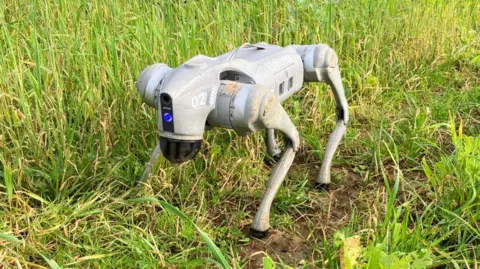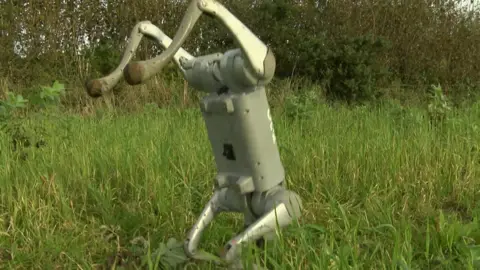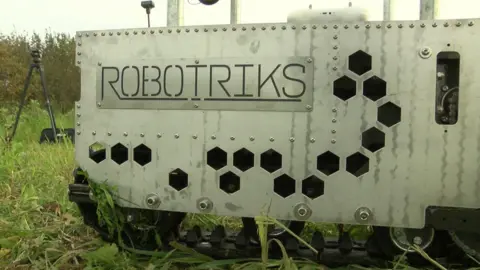
 Soil Association
Soil Association
A gamma ray detector mounted on a robot dog maps the health of soil
Robot dogs could help farmers more quickly assess the health of soil, scientists hope as a technology trial takes place in Cornwall.
A gamma ray detector on a device developed by a Cornish company is being used to assess soil quality.
Farmer Malcolm Barrett, a tenant farmer from St Tudy near Bodmin, is working with scientists from the University of Plymouth who are using a gamma ray detector mounted on a robot dog to map the health of the soil in his fields.
He said he hoped the technology, which was better and faster than conventional analysis, could make farms more profitable buy reducing artificial additives if they were detected.


Robot dogs can be used for hard to reach places such as hills and hedgerows
The robot dog was built by former University of Plymouth student Jake Shaw-Sutton, co-director of robotics company Robotriks in Par.
He said: "Our newest trial is looking at and focusing on what's going on with the soil, because it's often not considered fully and that affects everything around it."
Robot dogs could also be used to examine hard-to-reach places such as hills and hedgerows, he added.
Mr Shaw-Sutton said: "He's got a top speed of 5m [16ft] a second, which is a tad faster than I am, and he weighs about 15kg [33lb].
"The key advantage is because of those legs he's able to climb up really difficult terrain and really difficult surfaces."


Tracked robots are also used to carry a sensor
The £25,000 gamma detector on the robot dog measures naturally occurring levels of radiation in the soil.
Other more conventional-looking robots on tank-like tracks have also been involved in the work.
Mr Barrett said: "Usually I'd use a trowel to dig out soil from five areas in a field.
"Then I'd have to send this to a laboratory and wait for the results."
Trial leader Will Blake, from the University of Plymouth, said: "The ultimate goal is to provide a map of soil properties that are relevant to the farmer and his decision-making.
"The problem that you have with traditional conventional soil assessments is that they're very time consuming and expensive.
"Normally, a farmer can only afford to have a few samples taken from any one field, then you have to wait some days or weeks for the data to come through."
 5 months ago
297
5 months ago
297



